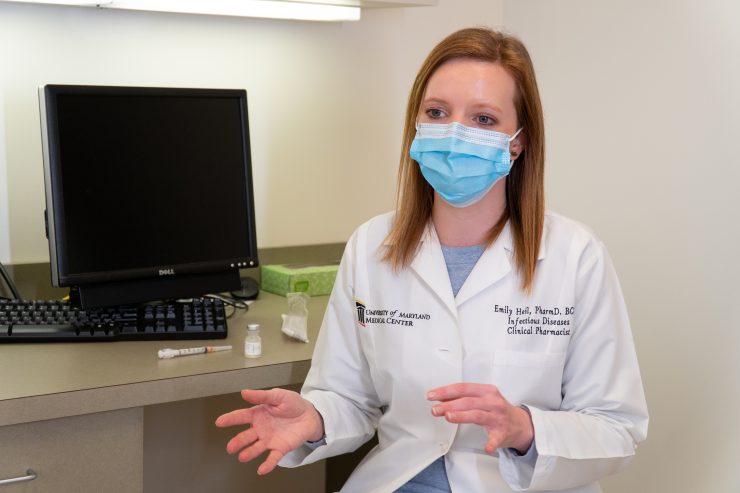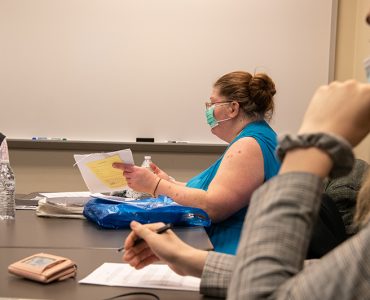Emily Heil, PharmD, MS, found herself in the right place at the right time as a specialist in infectious diseases. When the COVID-19 pandemic arose, Heil drew upon her knowledge as an associate professor of pharmacy practice and science at the University of Maryland School of Pharmacy (UMSOP) and her front-line duties at the University of Maryland Medical Center (UMMC) to help guide treatments.
Heil coordinates UMMC’s antimicrobial stewardship program. That role equipped her to lead development — and maintenance — of the University of Maryland Medical System (UMMS) treatment guidelines for COVID-19. Heil’s team deployed a digital platform that gives clinicians access to the well-established antimicrobial use guidelines, a reliable source for years of the latest evidence-based recommendations.
The medical center and the other 12 UMMS hospitals use the COVID-19 guidance to select optimal treatment based on current data. For example, an antiviral medication, remdesivir, has advanced from investigational use through various levels of U.S. Food and Drug Administration access for treating COVID-19.
But a year ago, clinicians confronted a high-stakes puzzle. “Initially, there were no national treatment guidelines, and as we worked to determine the most effective options for our COVID-19 patients, we were getting hit with a barrage of preprint research [draft research shared publicly before being peer reviewed], anecdotes, and case reports,” Heil recalls. “As pharmacists, we relied on each other and our professional societies, talking to others across the country.”
Heil also participates in screening and enrolling patients in COVID-19 clinical trials.
Heil had focused on antimicrobial stewardship well before the pandemic hit. That concept refers to a systematic effort to educate health care professionals and patients about evidence-based practices for the prescribing and use of antibiotics. The goal is to stop overuse and, as a result, limit pathogens’ chances to develop antimicrobial resistance. Otherwise, life-saving medications lose effectiveness.
It became clear early on that the pandemic would challenge stewardship efforts. Speaking at the fall 2020 meeting of the Presidential Advisory Council on Combating Antibiotic-Resistant Bacteria, Heil described nationwide barriers such as uncertainty in diagnosing co-infections and personnel shifts that diverted stewards’ attention or downsized staffs.
Like most faculty members at the University of Maryland, Baltimore, Heil made a pandemic pivot. She teaches Doctor of Pharmacy (PharmD) students and serves as a preceptor tasked with experiential education. In the latter role, she has enabled students to join hospital rounds at UMMC remotely or to counsel patients using telehealth. At UMSOP, she and her colleagues endeavored to help ground PharmD students in the midst of uncertain times by enhancing structure and consistency in coursework.
“We transitioned to interactive, case-based learning,” she says. Learning became entirely virtual, and coronavirus entered the curriculum.
Heil advocates for increased support of pharmacists and physicians in the infectious diseases field. They are central to antimicrobial stewardship, yet some hospitals cut programs during the pandemic, she told The Pew Charitable Trusts in an interview. The infectious disease profession is “essential to combating this and future pandemics” but is struggling due to several factors, such as low reimbursement for cognitive specialties, Heil says. “That’s a problem for humanity in the long term.”




